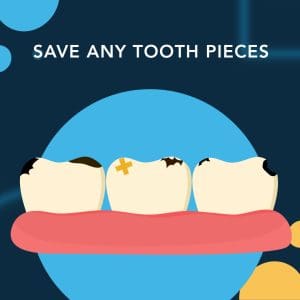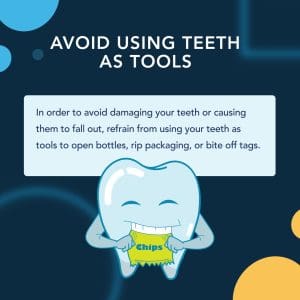Having chipped or missing teeth can negatively impact your smile, oral health, and confidence. Fortunately, modern dentistry provides various effective treatment options to restore teeth’s functionality and appearance. Each treatment option has its own benefits and considerations that you need to understand to make an informed decision about which treatment is best for your specific needs.
The Impact of Chipped & Missing Teeth
Missing or chipped teeth can significantly impact dental health and self-esteem. These issues can affect your ability to chew and speak, leading to discomfort and dietary restrictions. Aesthetically, they can alter your smile and decrease your confidence. Missing teeth can also cause your other teeth to shift over time, resulting in misalignment and further complications such as jawbone deterioration and changes to your facial structure.
How to Care for a Chipped or Broken Tooth
If you chip or break your tooth in Broward County and need to see a dentist, you can take some temporary measures to manage the symptoms. Start by rinsing your mouth with warm water to clean the affected area. You can also use a cold compress to reduce any swelling. For pain, there are some over-the-counter pain relievers that can help manage the discomfort. These steps should provide temporary relief and protection until you can receive professional treatment.
Rise the Mouth
If you chip or break a tooth, it’s important to promptly rinse your mouth with warm water. This action helps clear away any debris and bacteria and reduce the risk of infection. Rinsing also soothes the area, minimizing discomfort until you can receive professional dental care.
Use Cold Compress
Using a cold compress is an effective way to care for a chipped or broken tooth. Apply it to the outside of your cheek near the affected area to reduce swelling and numb pain. This immediate action can provide significant relief and help manage inflammation until you can see a dentist.
Save Any Tooth Pieces
If you chip or break a tooth, carefully collect and save any pieces you can find. It’s recommended to store the pieces in a small container with milk or saliva to keep them moist. Bringing these fragments to your dentist can sometimes help in the repair process, especially if the break is significant.
Avoid Hard Foods
After chipping or breaking a tooth, it’s crucial to avoid hard foods to prevent further damage. Opt for soft foods that require minimal chewing, such as yogurt, smoothies, or soup. This adjustment can help protect the damaged tooth from additional stress and discomfort until you can receive professional dental treatment.
Cover Sharp Edges
If a chipped or broken tooth has left sharp edges, cover them with dental wax or sugar-free gum to protect your tongue, cheeks, and gums from cuts. This temporary solution can provide relief and safety until you visit the dentist for a permanent repair.
Take Over-the-Counter Pain Relievers
To manage discomfort from a chipped or broken tooth, consider taking over-the-counter pain relievers such as ibuprofen or acetaminophen. These medications can help reduce pain and control inflammation around the affected area. Always follow the dosage instructions on the packaging or as advised by a healthcare professional.
Brush Gently
If you have a chipped or broken tooth, continue to brush gently around the affected area. Use a soft-bristled toothbrush and avoid vigorous brushing to prevent further damage to the tooth and irritation to sensitive areas. Maintaining oral hygiene is important, even when dealing with dental injuries.
Avoid Extreme Temperatures
When dealing with a chipped or broken tooth, it is crucial to steer clear of foods and drinks that are too hot or cold. Extreme temperatures can aggravate sensitivity and cause discomfort in the affected tooth. It is recommended to choose items at room temperature to reduce pain and prevent further damage.
See a Dentist Promptly
Seeing a dentist promptly after chipping or breaking a tooth is necessary for effective treatment. A Davie dentist can assess the damage and provide the necessary interventions, such as smoothing the chip or applying a restoration, to prevent further deterioration and restore the tooth’s function and appearance. Delaying treatment often leads to complications and more extensive repairs.
Treatment Options for Chipped Teeth
There are various treatment options for chipped teeth, depending on the severity of the damage. Minor chips might only require dental bonding, where a tooth-colored resin is applied and shaped to restore the tooth’s appearance. More significant chips could require a dental crown or veneer to cover and protect the tooth. In cases where the pulp is exposed, a root canal may be needed, followed by a crown. A dental professional will be able to assess the damage that has been done to the tooth and provide recommendations based on the options that are best for you.
Dental Bonding
Dental bonding is an effective treatment for minor chips and cracks in teeth. During this treatment, a dentist applies a tooth-colored composite resin, or bonding material, to the damaged area, then shapes and polishes it to blend seamlessly with the surrounding tooth structure. This quick and cost-effective procedure restores both function and aesthetics without removing significant tooth enamel.
Veneers
Dental veneers are a popular treatment option for chipped teeth, especially when a more aesthetic restoration is desired. These thin shells of porcelain or composite material are custom-made to cover the front surface of the tooth, providing a new facade that conceals the damage. Veneers are durable, stain-resistant, and can dramatically improve the appearance of a tooth.
Dental Crowns
Dental crowns are ideal for restoring teeth that have suffered significant damage, such as large chips or extensive decay. A crown fully encapsulates the entire visible portion of the tooth above the gum line, providing strength, protection, and a new surface that matches the appearance of your teeth. Crowns are durable and function like natural teeth, making them a long-term solution for broken teeth.
Root Canal Therapy
Root canal therapy is required when a chip or crack in a tooth extends into the pulp, the tooth’s inner chamber that contains nerves and blood vessels. This procedure involves removing the damaged pulp, cleaning the internal space, and sealing it to prevent further infection. A crown is often placed afterward to strengthen and protect the tooth.
Solutions for Missing Teeth
There are many solutions for missing teeth, each designed to restore functionality and enhance oral aesthetics. Dental implants are a popular choice as they provide a long-lasting and natural-looking solution, by replacing the tooth root and integrating it with the jawbone. Bridges can also be used to close the gap between teeth by attaching a prosthetic tooth to the surrounding natural teeth. Dentures, on the other hand, can replace multiple teeth or the entire dental arch, and help restore the full function and appearance of the mouth. It’s important to consider all available options, and a dentist can guide you through the process and help you choose the best treatment plan for you.
Dental Implants
Dental implants are a top-tier solution for missing teeth, providing a durable and realistic alternative. The procedure involves surgically inserting a titanium post into the jawbone, which functions as an anchor for a crown. This setup mimics the root of a natural tooth, ensuring stability and preventing jawbone decay while restoring complete chewing ability and aesthetic appearance.
Bridges
Dental bridges are a commonly used solution to replace one or more missing teeth. In this restoration, prosthetic teeth are attached to crowns that are cemented onto the natural teeth or implants adjacent to the gap. This not only fills the space but also prevents the remaining teeth from shifting, which helps to maintain proper alignment and oral function.
Partial Dentures
Partial dentures are a cost-effective solution for replacing multiple missing teeth. These removable appliances consist of replacement teeth attached to a gum-colored plastic base, which may be connected by a metal framework. Partial dentures help restore dental function and appearance, while also preventing the remaining natural teeth from shifting out of their proper positions.
Full Dentures
Full dentures are a complete remedy for people who have lost all teeth in a particular arch, either upper or lower. These detachable prosthetics consist of a full set of false teeth attached to a base that is colored like gum. Full dentures help restore the capacity to eat and converse correctly, and they also aid in maintaining facial structure by supporting the lips and cheeks.
What to Consider When Choosing a Treatment
When it comes to addressing dental issues, there are a number of factors to consider. You should think about the extent of the damage, your overall oral health, and financial considerations. It’s also important to evaluate the durability and maintenance requirements of the different treatment options, such as implants, bridges, or dentures. To make the best decision for your long-term health and lifestyle needs, it’s advisable to consult with a dental professional. They can help you understand the benefits and potential drawbacks of each choice so that you can choose the best treatment option.
Aesthetic Goals
When it comes to choosing a dental treatment, it’s important to carefully consider your aesthetic goals. Whether you’re aiming for a natural look, matching the color of your existing teeth, or a complete smile transformation, the chosen treatment should meet your expectations for appearance. It’s recommended to discuss options such as veneers, crowns, or bonding with your dentist, who can provide advice on the best solutions to achieve a seamless and attractive result that complements your overall facial aesthetics.
Functional Needs
It is important to take into account the functional needs when selecting a treatment for chipped or broken teeth. You should evaluate how options such as bridges, implants, or dentures will impact your ability to chew, speak, and maintain oral hygiene. Each treatment has its own benefits in terms of stability and longevity, which should all be discussed with your dentist to choose a solution that will best restore full functionality and suit your daily routine.
Longevity & Durability
In addition to functional needs, it’s essential to evaluate the expected lifespan of treatments such as implants, bridges, or crowns, and comprehend the maintenance they require. Careful consideration of the materials used and the typical wear they can withstand is necessary to guarantee long-lasting benefits to your oral health.
Cost & Insurance Coverage
Various dental treatments such as implants, veneers, or dentures differ greatly in cost. Therefore, it is essential to comprehend the coverage provided by your insurance plan and any out-of-pocket expenses you may have to bear. It is advisable to discuss financing options with your dentist or insurance provider to determine the optimal treatment that aligns with both your financial capabilities and dental health needs.
Your Overall Health
When deciding on a treatment for chipped or missing teeth, it is important to take into account your overall health. Certain procedures, such as dental implants, involve surgery and may not be suitable for everyone, particularly those who have certain chronic conditions or weakened immune systems. It is imperative to talk about your medical history and any present health concerns with your dentist to guarantee that the chosen treatment is safe and appropriate for your particular health circumstances.
How to Prevent Chipped Teeth or Teeth Falling Out
It is crucial to maintain the integrity of your teeth to ensure a healthy smile. Experiencing chipped teeth or teeth falling out can be distressing and impact your overall oral health. Thankfully, there are practical strategies that you can implement to prevent such dental mishaps. You can take protective measures during sporting activities and practice daily oral hygiene to safeguard your teeth from damage and loss.
Wear Mouthguards
Mouthguards provide excellent protection during physical activities or sports, to prevent teeth from chipping or falling out. They act as a cushion against blows that could damage the teeth or gums. Custom-fitted mouthguards, which can be obtained from dentists, are more comfortable and offer better protection compared to over-the-counter options.
 Avoid Using Teeth as Tools
Avoid Using Teeth as Tools
In order to avoid damaging your teeth or causing them to fall out, refrain from using your teeth as tools to open bottles, rip packaging, or bite off tags. These actions put an unnecessary amount of pressure on your teeth, which can result in chips, cracks, or even fractures. Instead, use the appropriate tools to help maintain the health of your teeth and preserve their integrity.
Maintain Good Oral Hygiene
Maintaining good oral hygiene is crucial to preventing teeth from chipping or falling out. Regular brushing and flossing help remove plaque and prevent decay, which can weaken teeth. By incorporating fluoride toothpaste and antiseptic mouthwash into your oral care routine, you can strengthen your tooth enamel and fight against bacteria, reducing the risk of dental problems that might lead to structural damage.
Regular Dental Checkups
Regular dental checkups are important for preventing chipped teeth or teeth from falling out. During these visits, dentists can identify and address early signs of tooth decay or weakness that may cause damage. Professional cleanings also remove tartar buildup, which helps to maintain enamel strength and overall tooth health and reduces the risk of future dental issues.
Treat Bruxism
Bruxism, commonly known as teeth grinding, can lead to chipping, cracking, and even tooth loss. Regular dental checkups can help detect signs of bruxism early on. Dentists can provide custom-fitted night guards to protect teeth while you sleep and also suggest techniques to reduce stress and improve sleep hygiene. Addressing bruxism not only protects your teeth but also helps alleviate related jaw pain and headaches.
Correct Misalignments
Correcting misalignments in your teeth is essential for preventing chipped teeth or teeth from falling out. When your teeth are correctly aligned, they distribute biting forces evenly, which reduces the risk of damage and enhances overall oral health. Orthodontic treatments such as braces or clear aligners can address these misalignments and are a proactive approach that helps maintain the strength and integrity of your teeth.
Stay Hydrated
Staying hydrated is beneficial for preventing chipped teeth or teeth from falling out. Regular hydration helps maintain saliva production, which naturally cleanses the teeth and gums, reducing the risk of decay that can weaken teeth. Drinking water also helps flush out food particles and bacteria, further protecting teeth from potential damage and maintaining overall oral health.
Schedule a Dental Checkup Appointment
Scheduling a dental checkup appointment is essential, especially for preventing and managing issues like chipped teeth or teeth falling out. Regular exams with a dentist in Davie, Florida, allow dental professionals to assess the structural integrity of your teeth, identify any weaknesses, and provide treatments or preventive measures to strengthen them. These checkups can catch early signs of wear, cracks, or decay that may lead to more severe damage if left untreated. Call our office to schedule a dental checkup appointment and find a dentist near me in Davie, Florida.
September 27, 2024

 Adult
Adult




 Avoid Using Teeth as Tools
Avoid Using Teeth as Tools